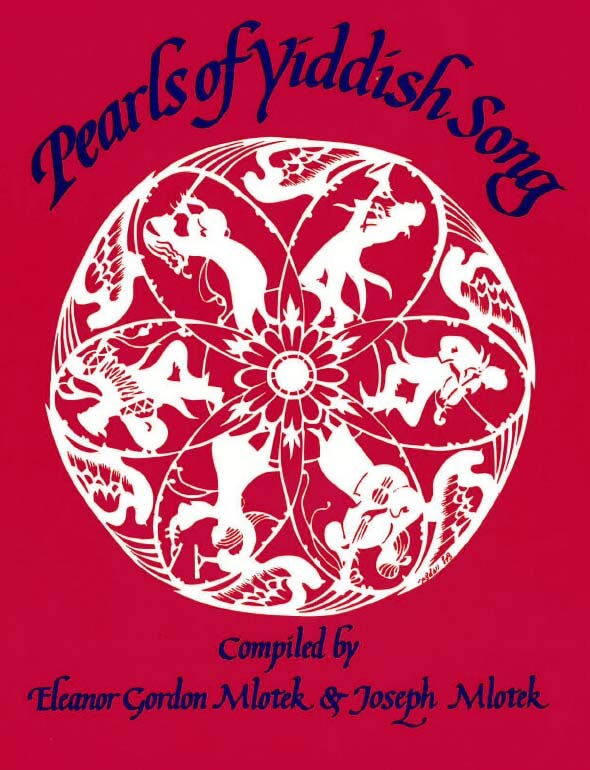Also entitled “Zemer,” (Tune) and “Bom-bom, biri-biri-bom.” Words are by Aaron Zeitlin (1889-1973); music by Samuel Bugatch (1898-1984). Published in sheet music by Metro Music Co., N.Y., 1947.

Rabbi Motenyu says:
Good morning to You, dear Lord!
Remove your wrath from us and we’ll act according to Your laws.
Oh, the saints go up!
Oh, the wicked fall down!
Bom, bom…
Rabbi Motenyu says:
Good afternoon to You, dear Lord!
The day is hot and the struggle is hard, but we haven’t given up our weapons.
Rabbi Motenyu says:
Good evening to You, dear Lord!
The day is over and I’ve done everything.
Give me a good night.
Zogt der rebe reb Motenyu:
A gut-morgn dir, gotenyu!
Nem arop fun undz dayn kas,
Vet men ton kedin vekedas.
Refrain:
Oy, tsadikim, tsadikim geyen bom,
Oy, reshoyim, reshoyim faln bom.
Bom, bom, biri-biri-bom
Bim-bom, bim-bom, biri-biri-bom.
Zogt der rebe reb Motenyu:
A gut-helf dir, gotenyu!
Der tog iz heys, di milkhome iz shver,
Nor men lozt nit aroys dos gever.
Zogt der rebe reb Motenyu:
A gutn-ovnt dir, gotenyu!
Der tog iz avek, ikh hob alts gemakht,
Gib zhe mir a gutinke nakht.
זאָגט דער רבי ר’ מאָטעניו:
— אַ גוט־מאָרגן דיר, גאָטעניו!
נעם אַראָפּ פֿון אונדז דײַן כּעס,
װעט מען טאָן כּדין וכּדת.
רעפֿרײן:
אױ, צדיקים, צדיקים גײען, באָם,
אױ, רשעים, רשעים פֿאַלן, באָם.
באָם, באָם, בירי־בירי־באָם,
בים־באָם, בים־באָם, בירי־בירי־באָם.
זאָגט דער רבי ר’ מאָטעניו:
— אַ גוט־העלף דיר, גאָטעניו!
דער טאָג איז הײס, די מלחמה איז שװער,
נאָר מען לאָזט ניט אַרױס דאָס געװער.
זאָגט דער רבי ר’ מאָטעניו:
— אַ גוטן אָװנט דיר, גאָטעניו!
דער טאָג איז אַװעק, איך האָב אַלץ געמאַכט,
גיב זשע מיר אַ גוטינקע נאַכט.
Song Title: Reb Motenyu

First published in 1988 as Pearls of Yiddish Song: Favorite Folk, Art and Theatre Songs, this anthology contains 115 songs. Some material had never been published, while others, included in rare song collections or sheet music, were largely inaccessible. The songs presented reflect Jewish life in Eastern Europe and the United States and depict childhood, love, family celebrations, poverty, work and struggle. There are also songs from the Hasidic and Maskilic movements, songs of Zion and of America, as well as songs from the Yiddish theater.
The title of this anthology derives from the weekly two-page feature column “Pearls of Yiddish Poetry,” which the compilers Yosl and Chana Mlotek initiated in 1970 in the Yiddish newspaper Der Forvertz (the Yiddish Daily Forward). Hundreds of readers from around the world — including authors, composers, singers, actors — became co-participants in this collective folk project and recalled melodies, lines, fragments, stanzas and their variants of songs, poems, and plays which they had heard in their youth. At first, readers sent in only written material. Later, they also taped songs on cassettes, many of whose melodies had, until then, never been recorded. They also identified and supplied missing information regarding lyricists, poets, and composers and described the circumstances surrounding the songs’ origins, their dissemination, diffusion and impact.